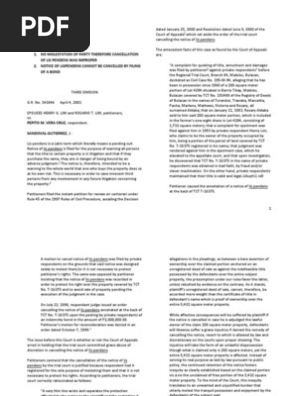0% found this document useful (0 votes)
66 views3 pagesLis Pendens in Property Partition Cases
This case discusses the purpose and cancellation of a notice of lis pendens. Specifically, it analyzes whether a notice of lis pendens amounts to a collateral attack on a title that has been registered for over 28 years. The court held that a notice of lis pendens does not constitute a collateral attack on a certificate of title, as it only serves to announce that a property is in litigation. Further, ownership cannot be definitively resolved and partitioned without first determining ownership in the case. A notice of lis pendens can only be cancelled if it was filed to improperly interfere with the adverse party's title or if it is not necessary to protect the filing party's claim to the property.
Uploaded by
Thessaloe B. FernandezCopyright
© © All Rights Reserved
We take content rights seriously. If you suspect this is your content, claim it here.
Available Formats
Download as DOCX, PDF, TXT or read online on Scribd
0% found this document useful (0 votes)
66 views3 pagesLis Pendens in Property Partition Cases
This case discusses the purpose and cancellation of a notice of lis pendens. Specifically, it analyzes whether a notice of lis pendens amounts to a collateral attack on a title that has been registered for over 28 years. The court held that a notice of lis pendens does not constitute a collateral attack on a certificate of title, as it only serves to announce that a property is in litigation. Further, ownership cannot be definitively resolved and partitioned without first determining ownership in the case. A notice of lis pendens can only be cancelled if it was filed to improperly interfere with the adverse party's title or if it is not necessary to protect the filing party's claim to the property.
Uploaded by
Thessaloe B. FernandezCopyright
© © All Rights Reserved
We take content rights seriously. If you suspect this is your content, claim it here.
Available Formats
Download as DOCX, PDF, TXT or read online on Scribd
/ 3









































































































